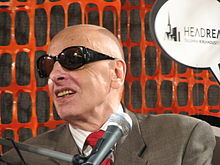- Mats Traat
-
Mats Traat (born November 23, 1936 in Arula, Otepää Parish) is a prolific Estonian poet and author.
Literature
Traat is frequently compared to Jaan Kross. However, unlike Kross, who writes about individuals influenced from beyond Estonian culture, Traat writes about the indigenous Estonian population. His central topics are the changes and the developments of Estonian rural life in the course of centuries, with an emphasis on people's ethical choices. In Trees Were, Trees Were Tender Brothers (1979), a young protagonist has to wage a struggle to keep a farm running, something he never desired to do.[1] Pasqueflower, Antidote for Sadness (1982/uncensored version 1990) covers on the one hand the fate of ancient Livonians, conquered and formally aligning with the Christian invaders, yet maintaining pagan convictions, on the other hand the problems of rural life during the stagnation era Estonian SSR, a topic which is related to the theme of personal problems of a writer, who is actually writing a books on the aforementioned Livonian topics. Dance around the Steam Boiler (1971; originally a film scenario, that was finally accomplished in 1988) illustrates with five 'dances' with the steam boiler the changes of rural life in half a century. In the move, filmed during the perestroika era, a sixth 'dance' has been added, showing the old age of main characters on the background of the typical rural scenes of 1980s: industrial and technological developments combined with a reckless destruction of the environment.
Traat debuted in 1962 with a collection of poetry. He has published over 20 anthologies of poetry to date. His poetry frequently deals with social commentary and society's adoration for science. His lyrics praise nature and his native country. He has also translated poetry from Slavic languages (Polish, Macedonian, Czech).
Traat's short stories are also famous. The Cross of Power won the Friedebert Tuglas Award for Short Prose.
Footnotes
Sources
Categories:- Estonian poets
- Estonian short story writers
- Living people
- 1936 births
- Recipients of the Order of the White Star, 4th Class
- Estonian people stubs
Wikimedia Foundation. 2010.

